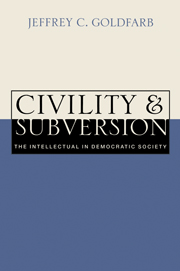Book contents
- Frontmatter
- Contents
- Acknowledgments
- 1 Introduction: the intellectuals at century's end
- 2 Who are the intellectuals?
- 3 The civil intellectual and the public
- 4 The subversive intellectual and the public
- 5 The civil society ideal
- 6 The intellectuals and the politics of culture after communism
- 7 The university
- 8 Race and discursive disruption
- 9 Race and sustained deliberation
- 10 Why is there no feminism after communism?
- 11 Civility and subversion in cynical times
- Notes
- Bibliography
- Index
8 - Race and discursive disruption
Published online by Cambridge University Press: 06 July 2010
- Frontmatter
- Contents
- Acknowledgments
- 1 Introduction: the intellectuals at century's end
- 2 Who are the intellectuals?
- 3 The civil intellectual and the public
- 4 The subversive intellectual and the public
- 5 The civil society ideal
- 6 The intellectuals and the politics of culture after communism
- 7 The university
- 8 Race and discursive disruption
- 9 Race and sustained deliberation
- 10 Why is there no feminism after communism?
- 11 Civility and subversion in cynical times
- Notes
- Bibliography
- Index
Summary
When it comes to race, America's is the very opposite of a Habermasian ideal speech situation. No problem in American society is more in need of intellectual intervention. This topic is so systemically distorted that it is sometimes hard to imagine how any honest discussion occurs across racial divides. If the role of the intellectual is to help promote informed discussion about difficult social problems, then it is in the arena of racial affairs that intellectuals are most needed in America.
Consider how we speak about the issue in the political arena. When David Duke, the former Nazi and Ku Klux Klan leader, ran as the Republican candidate for Governor of the State of Louisiana, he campaigned in codes. He did not propagate explicit anti-black or anti-semitic ideas, but instead celebrated our Christian heritage and our right to sustain it, and defended the equal civil rights of whites. In principle, the idea of equal rights for whites is, of course, a perfectly reasonable one. Yet, when the injustice of race relations still clearly involves the privilege of whites over blacks, the slogan's racist meaning is apparent. This man used the language of civil liberties and tolerance to convey his xenophobic messages. He did get perilously close to winning the election (obtaining over 40% of the total vote, including a majority of the votes of whites). Yet with his loss, racist newspeak suffered a setback.
- Type
- Chapter
- Information
- Civility and SubversionThe Intellectual in Democratic Society, pp. 146 - 160Publisher: Cambridge University PressPrint publication year: 1998



